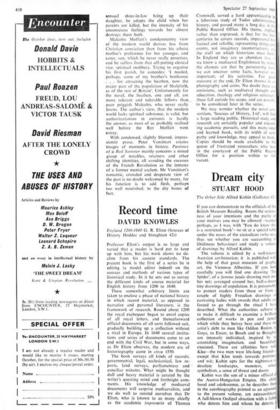Record time
DAVID KNOWLES
England 1100-1640 G. R. Elton (Sources of History Hodder and Stoughton 42s)
Professor Elton's output is so large and varied that a reader is hard put to keep up with him, but his work shows no de- cline from his austere standards. The present book is the first of a series he is editing (a model editor indeed) on the sources and methods of various types of historical study. In it he sets out to survey the different kinds of source material for English history from 1200 to 1640.
These somewhat arbitrary limits are taken to enclose a phase of national history in which record material, as opposed to narrative and personal literature, is the framework of research. Round about 1200 the royal exchequer began to enrol copies of all royal letters, and thenceforward official documents of all sorts followed suit, gradually building up a collection without a rival in Europe. In 1640 several institu- tions and series of documents came to an end with the Civil War, but in some ways, as Dr Elton observes, the modern era of historiography came in circa 1550.
The book surveys all kinds of records; governmental, legal, ecclesiastical, law re- ports, land surveys, parliamentary and conciliar minutes. What might be thought dull and heavy material is aerated by the writer's questing mind and forthright com- ments. , His knowledge of mediaeval documents will surprise mediaevalists, and we do well to remind ourselves that Dr Elton, who is known to so many chiefly as the academic impresario of Thomas
Cromwell, served a hard apprenticeship in a laborious study of Tudor administrative history, and passed many a long day in the
Public Record Office. His theme, implied rather than expressed, is that for the four
centuries he covers records, impersonal but factual and reliable, representing things and events, not imaginary reconstructions, are the stuff on which historians must build. In England they are so abundant that, it we know a mediaeval Englishman by name. the chances are that by persevering work we can uncover some facts, however un- important, of his activities. For good measure at the end, Dr Elton throws in air photography and coins. No doubt there are omissions, such as mediaeval thought and education, theology and religious sentiment: these fall outside his scope, and are possibl, to be considered later in the series.
We may wonder whether the novel con sortium, 'Sources of History, Ltd', will fin, a large reading public. Historical study and research are certainly popular and expand- ing academic pursuits, and this many-sided and learned book, with its width of sym- pathy and knowledge, may appeal to many. Copies should be made available to the queue of frustrated researchers who wait in the courtyard of the Public Record Office for a position within to fall vacant.






































 Previous page
Previous page